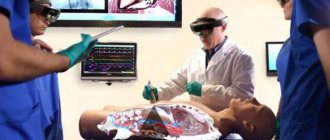How do most of us feel after a sleepless night? Tired, irritable and seemingly “out of place.” But night sleep lasting less than the recommended 7-9 hours does not just make a person distracted and nervous. The consequences of chronic sleep deprivation are much more serious and can cause a variety of health problems: from weight gain to a weakened immune system.
Symptoms
A person with a lack of sleep has characteristic symptoms reminiscent of the onset of the flu:
- Paleness of the skin.
- Lethargy, general weakness, nausea.
- Redness of the eyes, bags under the eyes.
- Feeling dizzy, frequent headaches.
- Inhibition of action.
- My heart hurts.
- Apathy, irritability.
- High blood pressure in people with hypertension and vegetative-vascular dystonia.
- Rarely there is fever and toothache.
The body of a person who constantly experiences these symptoms is in a painful and even painful state. Of course, lack of sleep will not lead to death, unless you deprive yourself of sleep completely and for a long time. But in the long term, lack of sleep can cause many diseases and cause significant harm to the body.
Consequences of lack of sleep
Constant lack of sleep weakens the immune system, increasing the risk of cardiovascular and other diseases.
Long-term lack of sleep also affects a person’s mental health. Reaction speed decreases, the emotional sphere suffers, memory deteriorates, and creativity decreases. A person may lose a critical attitude towards his actions, and obsessive thoughts appear. If your sleep situation does not improve, your risk of mental illness increases.
Fatigue from constant lack of sleep can lead to chronic depression; the risk of its development, according to various sources, becomes 10 times higher.
We know from history that the torture of insomnia has always been one of the most terrible. When a person was not allowed to sleep, at first he experienced severe headaches, then a faint state. If the torture continued, the person lost her mind.
Nowadays, there are a huge number of car accidents in the world, the cause of which is falling asleep at the wheel. According to the Automobile Association of America (AAA), every tenth traffic accident in the United States occurs due to lack of sleep. Conservative estimates suggest that sleeping at the wheel kills 10,000 people a year there.
Lack of rest negatively affects adults, what can we say about children and teenagers, with their vulnerable and unstable psyche.
It should be noted that sleep disorders are a diagnostic criterion for many mental illnesses. The “first sign” of mental illness is sleep disturbance
If lack of sleep causes negative changes, then a good night's rest is the key to mental health. A person who has had enough sleep is alert, efficient, and active. He has a good mood and well-being, which becomes an effective defense against the occurrence of mental disorders.
What does lack of sleep lead to?
Sleep deficiency leaves an imprint on a person’s life.
Closedness in communication
The first consequence of not getting enough sleep is a lack of desire to socialize. Rare nights without sleep will not have such a detrimental effect, but will still increase activity and lower your mood. But constant lack of sleep will make even the most cheerful and cheerful person apathetic and withdrawn. A person becomes uninterested in the world around him, as a result of which he avoids meeting with friends, noisy parties and even dates.
Psychological disorders
Sleep is a complex physiological process. Its onset activates the production of vital hormones for humans, which play an important role in the proper functioning of the body. First of all, lack of sleep leads to disruptions in the production of the hormone of happiness and peace of mind - serotonin.
People who sleep only a few hours a night are more pessimistic, often become depressed and lose their ability to think clearly.
Hallucinations are a characteristic symptom. They perceive the world around them in gloomy tones and stop enjoying little things and pleasant events. The future is not interesting for them, and planning it is completely in vain.
It has been noticed that it is people with a systematic lack of sleep, who are constantly exhausted and tired, who are more likely to suffer from psychological disorders. Among them there are many more paranoid people with suicidal thoughts, and suicide is not uncommon.
Career problems
You can imagine a sleep-deprived person getting ready for work every day. He looks akin to a zombie: red closing eyes, dark circles, a pale lifeless face. Not the best example of a good employee. But this is only a visual aspect, physiologically his body is exhausted, and when he comes to work, he cannot immediately get involved in the work process.
He will need time to gather his strength, finally wake up and begin his functional duties around 11 o’clock in the morning. But then it’s time for lunch, after which you feel even more tired, you want to lie down at least for a while and take a nap. As a result, the rest of the working day is spent systematically studying the remaining time before returning home. What is the use of such an employee?
The presented model of a worker suffering from lack of sleep makes it clear how productive his day will be, how quickly he will complete his tasks, how high-quality his work will be and where this leads. After all, an apathetic attitude does not allow such a person to make plans for the future, think about improving his skills and career growth. His thoughts are busy with the journey home and the long-awaited rest.
Lack of sleep subdues. Feeling constant fatigue, a person loses faith in himself, he does not have the strength to strive for success, take risks, or take initiative. Tempting opportunities for career advancement also remain unaddressed. As a result, he withdraws into himself, becomes uncommunicative and secretive.
Workers who are constantly sleep deprived do not crave change and often avoid it. They rarely move up the career ladder, and due to frequent ailments, illnesses, absent-mindedness, inattention and mistakes, they lose their jobs altogether.
Sleep disorders - symptoms and treatment
Diagnosis of sleep disorders is carried out on the basis of data from a patient interview, examination, instrumental and laboratory studies.
To make a diagnosis of insomnia, it is enough for the patient to complain about difficulty falling asleep, waking up at night or early with difficulty falling asleep later, and worsening daytime well-being. However, additional studies may be needed to rule out other sleep disorders that lead to symptoms of insomnia. Polysomnography is used to diagnose OSA, periodic limb movement syndrome, parasomnias and all major sleep disorders. Circadian sleep-wake rhythm disturbances are detected using actigraphy.
The most optimal type of diagnosis of major sleep disorders is polysomnography [7], a study that allows one to evaluate the changes that occur in a person during sleep. This is the only examination method with which you can record an encephalogram, simultaneously evaluate the stages of sleep, breathing during sleep, and identify the relationship of various events (snoring, stopping breathing, leg movements, masticatory muscles, body position and electrocardiogram) with the stages of sleep and awakenings. However, the complexity of setting up and analyzing the study, the need to be in a separate room, the cost of equipment and diagnostics limit its use.
Actigraphy is a method for assessing the basic characteristics of sleep and the sleep-wake rhythm over a long period of time - from one to four weeks [8]. This method allows you to assess the stability of your sleep rhythm, for example, changes in the time of falling asleep and waking up on weekends
and working days, sleep rhythm during shift work. Used for insomnia and circadian sleep disorders. An actigraph is a compact wristwatch-sized device that is worn on the wrist and uses an accelerometer to measure motor activity and lighting.
When diagnosing obstructive sleep apnea syndrome, during the examination, attention is paid to the presence of pathology of the ENT organs: enlarged tonsils, chronic rhinitis, thickening of the tongue. The total airway clearance is assessed using the Mallampati scale when the patient opens his mouth and protrudes his tongue. If in this position the back wall of the pharynx and tonsils are not visible, the likelihood of breathing problems due to blocking the lumen of the oropharynx by the root of the tongue is high. Surgical treatment of ENT pathology in this case will be ineffective. Neck circumference is assessed, an important prognostic parameter for obstructive sleep apnea syndrome. Its risk increases significantly with a neck circumference greater than 43 cm in men and greater than 41 cm in women.
The most accurate method for diagnosing OSA is polysomnography, but Russian recommendations for determining obstructive sleep apnea in various diseases more often mention computer pulse oximetry or respiratory monitoring.
Cardiorespiratory monitoring is a method for assessing breathing disorders during sleep on an outpatient basis, when some of the device’s sensors are installed on the chest in the clinic, and the patient places the rest independently during sleep: in the nasal passages to record nasal breathing and on the finger to assess the saturation of hemoglobin in the blood with oxygen . Sensors on the chest, in addition to its movements, record an electrocardiogram and allow one to evaluate the effect of breathing disorders during sleep on the heart rhythm and their relationship with arrhythmias.
Computer pulse oximetry is a simple research method in which a pulse oximetry sensor is placed on a finger. Another screening method for assessing breathing is recording a rheopneumogram during Holter monitoring of the electrocardiogram. In this case, movements of the chest are recorded according to data from ECG sensors. If abnormalities are detected by a pulse oximeter or rheopneumogram, then a more complete examination is necessary to make a diagnosis.
It is worth suspecting OSA if 24-hour blood pressure monitoring reveals a disturbance in its circadian rhythm—no decrease in blood pressure or an increase at night.
In case of high daytime sleepiness, to exclude narcolepsy, the patient’s condition is assessed using the multiple sleep test. Moreover, after polysomnography, all sensors remain on the patient and he is given the opportunity to fall asleep during the day for 20 minutes every two hours.
To diagnose sleep disorders, questionnaires that assess the main symptoms are additionally used.
- The Pittsburgh Questionnaire assesses sleep quality and includes symptoms of major sleep disorders over the past month.
- The Berlin questionnaire and the STOP-BANG questionnaire are used to assess the risk of OSA.
- The Epworth Daytime Sleepiness Scale assesses the severity of sleepiness in different situations.
- The Munich chronotype assessment scale identifies the duration and time of sleep on weekdays and weekends, and determines the severity of social jet lag.
How does lack of sleep affect women's and men's appearance?
It has been proven that, suffering from chronic lack of sleep, representatives of both sexes age many times faster. This is all due to hormonal imbalances and, as a consequence, insufficient formation of collagen and elastin, which are responsible for the elasticity of the skin, its “freshness” and strength. In order not to look 5-10 years older than your age, you need to practice healthy sleep lasting at least 7-8 hours a day.
What does lack of sleep mean for the male body?
The consequences for men are as follows. The first thing men suffering from chronic sleep deprivation experience is a deterioration in physical fitness. A constant feeling of fatigue and general lethargy of the body discourage the desire to go to the gym. In addition, unproductive sleep has a detrimental effect on the production of the hormone responsible for the growth of muscle tissue.
But a more serious problem that men face with systematic lack of sleep is decreased potency. Scientists have confirmed that a lack of quality, long-term sleep reduces libido. Left alone with the problem that has arisen, a man often refuses sex, which leads to erectile dysfunction and decreased sperm quality. Such an outcome is unlikely to have a beneficial effect on relationships with the opposite sex.
Consequences of lack of sleep for women
Women suffering from chronic sleep deprivation stand out immediately. They are given out by typical signs: tired red eyes and bruises under the eyes, the face looks pale, there is no blush, the skin is flabby, swelling that cannot always be removed. Lack of healthy sleep leads to hormonal imbalance and, as a result, acne, excessive hair loss, weight gain, which further worsens the appearance.
Appearance of a woman suffering from chronic sleep deprivation
Systematic night wakefulness provokes a deficiency of melatonin (sleep hormone), the greatest activity of which occurs between midnight and 4 am. If you do not get rid of this harmful condition, the body will be overtaken by premature old age.
How to get rid of the problem
To fall asleep quickly and easily, you just need to know a few simple rules:
- You should have dinner properly. Don't overeat before bed. It is best to suppress the feeling of hunger with a banana or a glass of warm skim milk. Foods high in calcium help you relax and fall asleep faster.
- Drink healthy drinks. Warm chamomile tea is the best way to help you sleep. It contains glycine, which acts as a mild sedative. Adding a spoonful of honey helps overcome feelings of anxiety and enhance the calming effect of tea. Tea made from dried passionflower (passion flower) also helps you fall asleep quickly. But it has a number of contraindications, so it should be used with caution.
- Take a warm bath. It has been proven that nighttime sleep is preceded by a decrease in body temperature. If you artificially increase it by taking a warm bath, then upon returning to a cool bed, the body will be able to regulate it faster and fall asleep faster.
- Create a bedtime ritual. An hour before bedtime, turn off the TV, leave your smartphone or book aside, and let your body relax. Listen to calm music, be in silence, mentally summing up the day, or dream about something pleasant.
If you cannot get rid of lack of sleep on your own, treatment is necessary.
The most important
With chronic lack of sleep, the risk of developing cancer pathologies increases several times. The reason is the exhaustion of the body from lack of sleep, which leads to instability of the immune system, which is not able to recognize and “neutralize” the resulting malignant growth in time.
To avoid dangerous risks and ensure the coordinated functioning of the body, it is necessary to ensure healthy rest. Remember: quality sleep is one that lasts at least 7 hours. per day. During night sleep, the sleeping person should be in darkness and complete silence.
Sleep deprivation - mechanism of action
First of all, you need to increase the period of time during which the patient does not sleep, but is awake, and bring it to approximately forty hours (the patient wakes up as always in the morning, and then does not sleep all day, does not sleep at night, and also does not sleep the next day ). Only the next night can the patient be allowed to sleep for ten hours.
The patient’s condition may improve after the first use of the deprivation method, but, unfortunately, the improvement will not last long. In order to establish such a condition, it is necessary to apply the sleep deprivation treatment approximately six times, and perhaps more times.
Improvement in a patient with depression, as in many other diseases, is gradual and smooth. At first, the patient's condition may even worsen, but this will not last long. After using the sleep deprivation method, people fall asleep much faster and easier. With an increase in the number of procedures, the patient's mood and positive attitude gradually improves.
Contraindications for using the sleep deprivation method
The deprivation process has a targeted effect on certain areas of the brain. Therefore, absolutely no harm is caused to those areas of the brain that do not take part in the formation of a person’s depressive state. But this method should be used extremely carefully for patients with hypertension. You should also pay attention to the use of the deprivation method in patients suffering from any chronic diseases.
In any case, by contacting the Transfiguration Clinic, you can get extensive and detailed advice on the use of the deprivation method to overcome depression, its features, the mechanism of the treatment process and its possible results: phone number in Moscow Calls within Russia are free.
We do not believe in miracles, we treat problems in difficult people with the help of medicine and kind words. You can contact the clinic’s specialists by phone in Moscow.









